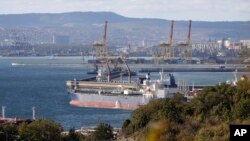A price cap of $60 per barrel imposed on seaborne Russian oil by the Group of Seven (G7) leading economies, the European Union, and several importing countries came into effect on December 5, as Russia remained defiant and said it would not recognize the restrictions.
The EU also introduced an embargo of seaborne Russian oil that took effect on December 5.
The price cap, which has been joined by the United States, Australia, Japan, and the United Kingdom, was intended to punish Moscow for its unprovoked aggression against neighboring Ukraine.
It stipulates that Russian oil can only be shipped to third countries using G7 or EU tankers, insurance companies, or credit institutions if the cargo is purchased at or below the price cap.
A similar price cap on Russian petroleum products is scheduled to take effect on February 5.
Russia said on December 4 that it rejects the price cap and will not sell oil below market prices, even if that means reducing production targets.
Kremlin spokesman Dmitry Peskov said on December 5 that a response to the price cap "is being prepared."
"One thing is obvious: We will not recognize any price caps," Peskov said, adding that the price cap will not have any impact on Russia's war against Ukraine.
Moscow reportedly was considering issuing a decree that would ban the sale of any petroleum products to any country applying the price cap.
The price cap will be reviewed every two months with the first review set for January.
G7 and EU countries set the cap fairly close to market prices in the expectation that Russia would accept lower profits and continue selling oil.
Ukrainian President Volodymyr Zelenskiy has called for the international community to set the price cap at $30 per barrel in order to ramp up pressure on the Russian economy. He said that if Russia agrees to sell oil at $60 per barrel, it would still bring in about $1 billion in annual oil revenues.
The Chinese Foreign Ministry on December 5 said Beijing will continue its "mutually beneficial" energy cooperation with Russia, which is the world's second-largest oil exporter.










